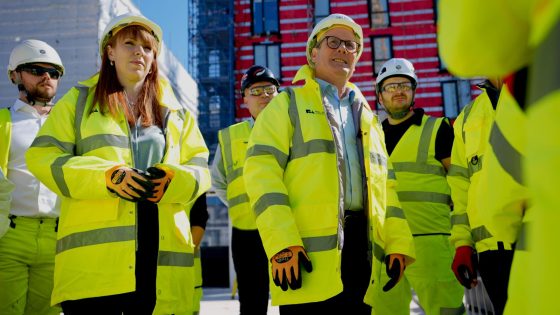The US Supreme Court has ruled that Donald Trump is immune from criminal prosecution for official acts conducted during his time as president but not unofficial acts. The ruling has a huge impact on cases connected to his attempts to overturn the results of the 2020 presidential election.
The former president’s defense has already been shot down by the federal judge overseeing the election interference case brought against him by special counsel Jack Smith, as well as by a unanimous panel of appeals court judges, the latter writing that Trump’s attempts to stay in power after losing the vote to Joe Biden four years ago represented “an unprecedented assault on the structure of our government.”
The court’s ruling could have profound consequences for holding former presidents accountable for crimes committed while occupying the White House.
But the court’s decision to take up the case – and to wait until the final day of its current session to issue a ruling – ensures that voters will not see a verdict in the case against Trump for unlawfully conspiring to overturn the last election before they cast their ballots in the next one this November.
Key Points
Supreme Court awards Donald Trump some immunity from prosecution
‘The President is now a king above the law’
Decision makes ‘mockery’ of principle ‘that no man is above the law’
Trump makes last-ditch Truth Social plea for immunity
Supreme Court weighs Trump’s immunity claim. Here’s what that means
15:52 , Oliver O’Connell Trump hails Supreme Court ruling
15:51 , Oliver O’ConnellAlex Woodward explains what happens next: This now gets kicked back to Judge Tanya Chutkan’s court. She will be tasked with determining whether all the actions listed in his indictment are “official” or “unofficial.”There is absolutely no chance that will finish any time before the election or even after the inauguration, so Trump is not only granted a sweeping new metric for immunity if he’s in office again, but he gets even more delays and a diminishing prospect of any trial.
‘The President is now a king above the law’
15:44 , Alex WoodwardThe dissents are vivid and terrifying, outlining how dangerous this ruling is, and the majority dismisses them as “fear-mongering.”Here, Justice Sotomayor lists acts that she now says are immune from prosecution:Looking beyond the fate of this particular prosecution, the long-term consequences of today’s decision are stark.The Court effectively creates a law-free zone around the President, upsetting the status quo that has existed since the Founding. This new official-acts immunity now “lies about like a loaded weapon” for any President that wishes to place his own interests, his own political survival, or his own financial gain, above the interests of the Nation. … The President of the United States is the most powerful person in the country, and possibly the world. When he uses his official powers in any way, under the majority’s reasoning, he now will be insulated from criminal prosecution. Orders the Navy’s Seal Team 6 to assassinate a political rival? Immune. Organizes a military coup to hold onto power? Immune. Takes a bribe in exchange for a pardon? Immune. Immune, immune, immune. Let the President violate the law, let him exploit the trappings of his office for personal gain, let him use his official power for evil ends. Because if he knew that he may one day face liability for breaking the law, he might not be as bold and fearless as we would like him to be. That is the majority’s message today.Even if these nightmare scenarios never play out, and I pray they never do, the damage has been done. The relationship between the President and the people he serves has shifted irrevocably. In every use of official power, the President is now a king above the law.
15:42 , Oliver O’ConnellJustice Ketanji Brown Jackson writes in dissent: The majority of my colleagues seems to have put their trust in our Court’s ability to prevent Presidents from becoming Kings through case-by-case application of the indeterminate standards of their new Presidential accountability paradigm. I fear that they are wrong. But, for all our sakes, I hope that they are right.In the meantime, because the risks (and power) the Court has now assumed are intolerable, unwarranted, and plainly antithetical to bedrock constitutional norms, I dissent.
Decision makes ‘mockery’ of principle ‘that no man is above the law’
15:40 , Oliver O’ConnellJustice Sonia Sotomayor writes in dissent: Today’s decision to grant former Presidents criminal immunity reshapes the institution of the Presidency. It makes a mockery of the principle, foundational to our Constitution and system of Government, that no man is above the law. Relying on little more than its own misguided wisdom about the need for “bold and unhesitating action” by the President, ante, at 3, 13, the Court gives former President Trump all the immunity he asked for and more. Because our Constitution does not shield a former President from answering for criminal and treasonous acts, I dissent.
15:39 , Oliver O’ConnellThe question then becomes whether that presumption of immunity is rebutted under the circumstances. It is the Government’s burden to rebut the presumption of immunity. The Court therefore remands to the District Court to assess in the first instance whether a prosecution involving Trump’s alleged attempts to influence the Vice President’s oversight of the certification proceeding would pose any dangers of intrusion on the authority and functions of the Executive Branch.Trump asserts a far broader immunity than the limited one the Court recognizes, contending that the indictment must be dismissed because the Impeachment Judgment Clause requires that impeachment and Senate conviction precede a President’s criminal prosecution. But the text of the Clause does not address whether and on what conduct a President may be prosecuted if he was never impeached and convicted. … Historical evidence likewise lends little support to Trump’s position. The Federalist Papers on which Trump relies concerned the checks available against a sitting President; they did not endorse or even consider whether the Impeachment Judgment Clause immunizes a former President from prosecution. Transforming the political process of impeachment into a necessary step in the enforcement of criminal law finds little support in the text of the Constitution or the structure of the Nation’s Government.We conclude that under our constitutional structure of separated powers, the nature of Presidential power requires that a former President have some immunity from criminal prosecution for official acts during his tenure in office. At least with respect to the President’s exercise of his core constitutional powers, this immunity must be absolute. As for his remaining official actions, he is also entitled to immunity. At the current stage of proceedings in this case, however, we need not and do not decide whether that immunity must be absolute, or instead whether a presumptive immunity is sufficient.
Supreme Court awards Donald Trump some immunity from prosecution
15:37 , Oliver O’ConnellPer the ruling of the Supreme Court in Trump v United States written by Chief Justice John Roberts: Under our constitutional structure of separated powers, the nature of Presidential power entitles a former President to absolute immunity from criminal prosecution for actions within his conclusive and preclusive constitutional authority. And he is entitled to at least presumptive immunity from prosecution for all his official acts. There is no immunity for unofficial acts.
Striking statement by a majority of the Supreme Court just now in the social media cases about the Fifth Circuit being out of step with the law: pic.twitter.com/n2V1dCXIrl
— Neal Katyal (@neal_katyal) July 1, 2024
15:21 , Oliver O’ConnellIn her dissent, Justice Jackson urges Congress to enact a new law to “forestall the coming chaos” created by the ruling on Corner Post, reimposing the statute of limitations that had, until now, prevented new plaintiffs from endlessly challenging regulations.She writes: “At the end of a momentous Term, this much is clear: The tsunami of lawsuits against agencies that the Court’s holdings in this case and Loper Bright have authorized has the potential to devastate the functioning of the Federal Government.”
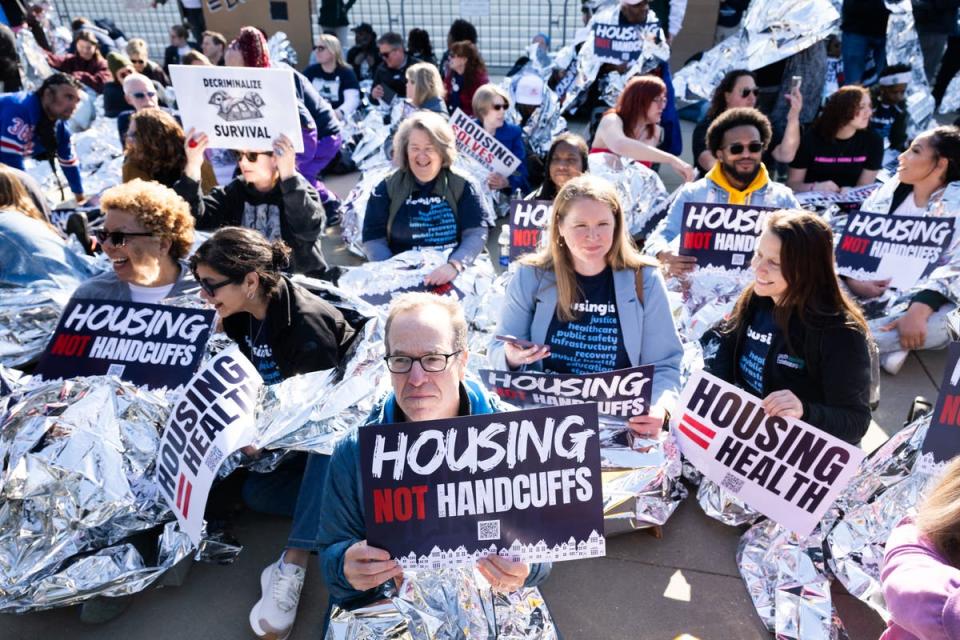
Supreme Court allows for laws criminalizing homelessness
15:00 , Joe SommerladHere’s another beauty from Friday’s judgement drop.Supreme Court allows for laws criminalizing homelessness
Two boxes
14:59 , Ariana BaioThe court issued its five-minute buzzer — this is typically when we find out how many “boxes” will be placed out for the day. The number of boxes correlates to the number of opinions. Each box can hold up to two opinions.Today we have two boxes, which was expected since the court has three opinions left.
How did justices react during oral arguments?
14:58 , Ariana BaioBack in April, the Supreme Court heard arguments in Donald Trump’s immunity appeal and by the end, it appeared certain that they were inclined to offer the former president some immunity from criminal prosecution.Most of the conservative male justices on the court expressed fear that without protections, political opponents could go after a former president.But the liberal wing of the court, joined by conservative appointee Amy Coney Barrett, appeared skeptical about total immunity. Justice Ketanji Brown Jackson raised concerns about future presidents being “emboldened to commit crimes” knowing they have protections from prosecution.
Two months to make ruling
14:39 , Ariana BaioDonald Trump’s immunity appeal is one of the last decisions to be made by the Supreme Court this term despite special counsel Jack Smith asking justices to decide the case quickly.They heard oral arguments on April 25th — the last day of the arguments calendar — but it’s taken them more than two months to decide how they will rule.The court is capable of making decisions fast, in December 2000 it only took one day to decide Bush vs Gore, and in 1971 it took four days to decide New York Times vs US.
Supreme Court overturns Chevron case that gave agencies oversight
14:30 , Joe SommerladWhile we await news from the court today on Trump, here’s a look at some more of its recent highly-consequential recent judgements.On Friday, thejustices broke with more than 40 years of precedent to hinder enforcement and oversight for federal agencies like the Environmental Protection Agency and Food and Drug AdministrationIn a 6-3 decision, the conservative majority of the Supreme Court handed down a ruling in an extraordinarily consequential case that will have intense ramifications for federal agencies and Congress.Moving forward, agencies will need to turn to Congress and the courts to interpret how their respective branches function in ambiguous situations. In the past, they were allowed to use their expertise to interfere with and enforce laws and regulations.
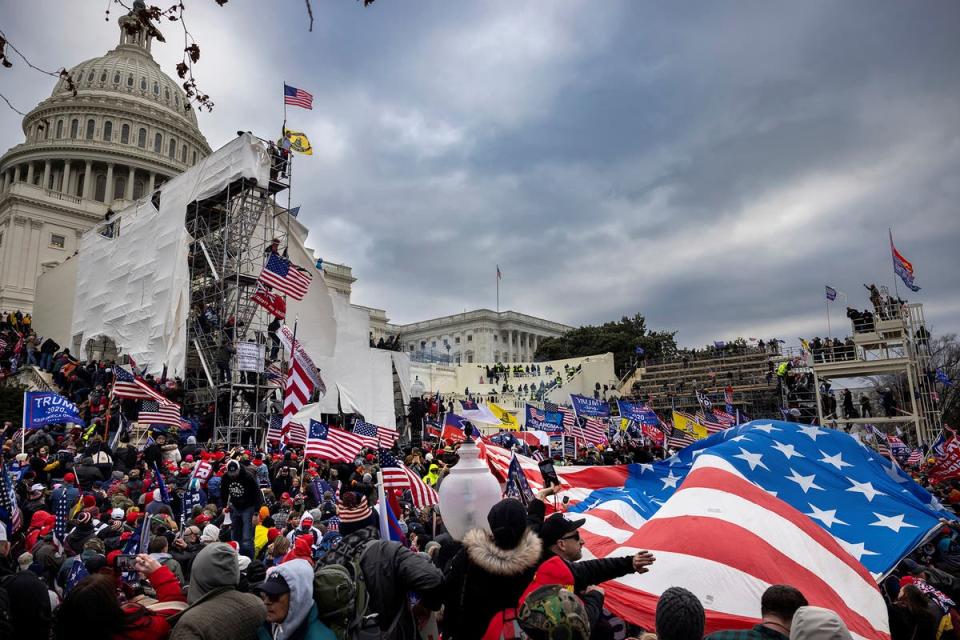

What does the Supreme Court’s latest decision mean for Jan 6 defendants?
14:00 , Joe SommerladThe Supreme Court’s decision to narrow how Jan 6 defendants may be charged with “obstruction of an official proceeding” will likely only impact a small number of convicted rioters.“The decision will not have tremendous significance in the January 6 cases, including that of former president Trump, because in almost all cases there are other charges that have a felony status alongside the obstruction charge,” said William Banks, a professor at Syracuse University College of Law.What does the Supreme Court decision mean for Jan. 6 defendants?


Over 300 January 6 riot convictions now in peril after Supreme Court rules on obstruction charge
13:30 , Joe SommerladMore than 330 January 6 rioters could have their convictions and sentences tossed thanks to a ruling from the Supreme Court on Friday.In a 6-3 decision, the court ruled that an “obstruction of an official proceeding” charge brought against Joseph Fischer, a former police officer and rioter, was too broadly used and the government will need to prove that a defendant “impaired the availability or integrity for use in an official proceeding of records, documents, objects, or other things used in an official proceeding, or attempted to do so.”The ruling could have massive impacts on Jan 6 defendants such as Fischer, who were convicted of storming the Capitol and destroying property to try and disrupt the certification of the 2020 election.However, the ruling appears to have little impact on the pending charges against Trump, who is also accused of obstruction in some of his cases.Ariana Baio reports.Over 300 Jan. 6 riot convictions now in peril after court rules on obstruction charge
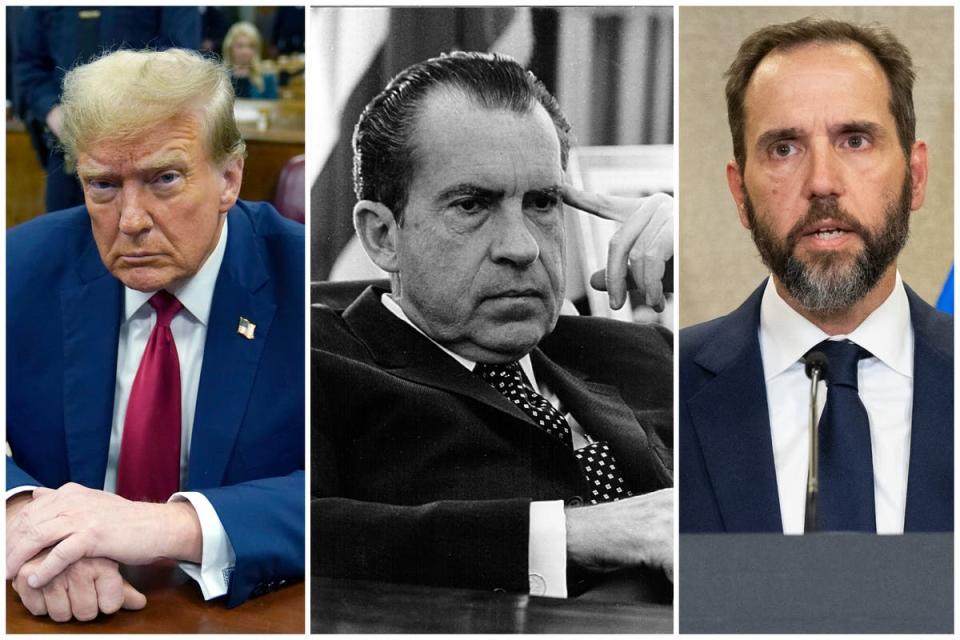

The Nixon rulings at the centre of Trump’s Supreme Court immunity case
13:00 , Joe SommerladBoth the former president and Justice Department special counsel Jack Smith cited court cases involving former president Richard Nixon to make their points for and against Trump’s immunity claim.The Republican is pointing to the 1982 Supreme Court case Nixon v Fitzgerald to argue that he should be immune from prosecution on federal election interference charges.Meanwhile, Smith is using the 1974 Supreme Court case United States v Nixon to argue that he should not be.The Nixon rulings at the centre of Trump’s Supreme Court immunity case
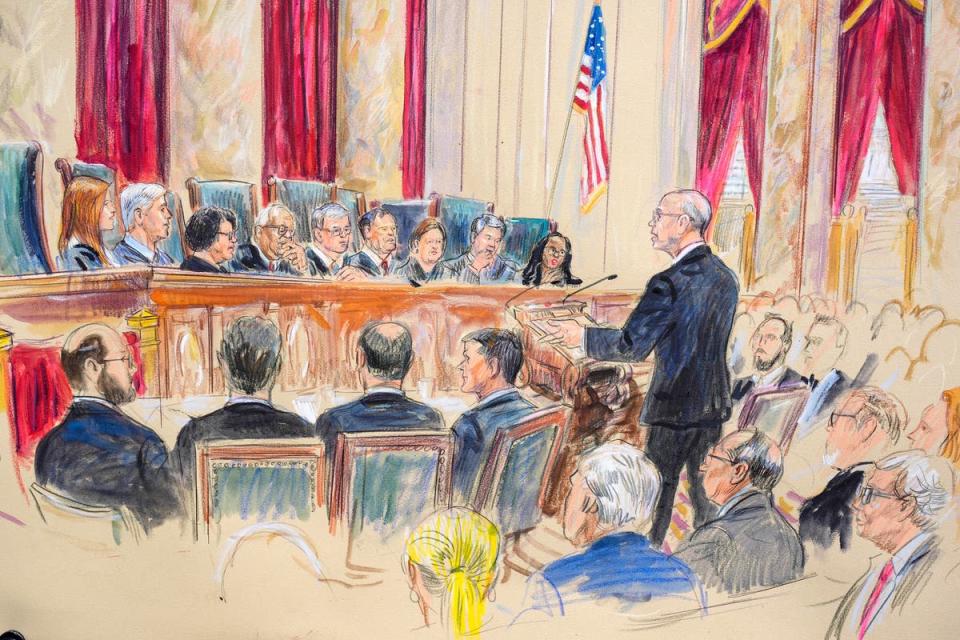

Key takeaways from oral arguments
12:30 , Joe SommerladThe Supreme Court spent over three hours on April 25 hearing oral arguments in the historic case involving former president Donald Trump’s claims of presidential immunity from prosecution.The nine justices questioned lawyers for Trump and the Justice Department’s special counsel and toyed with whether or not presidents should be awarded broad, some, or no immunity from criminal prosecution.Here’s Ariana Baio with a reminder of the key points to emerge from that hearing.Key Takeaways from Trump’s immunity arguments at the Supreme Court
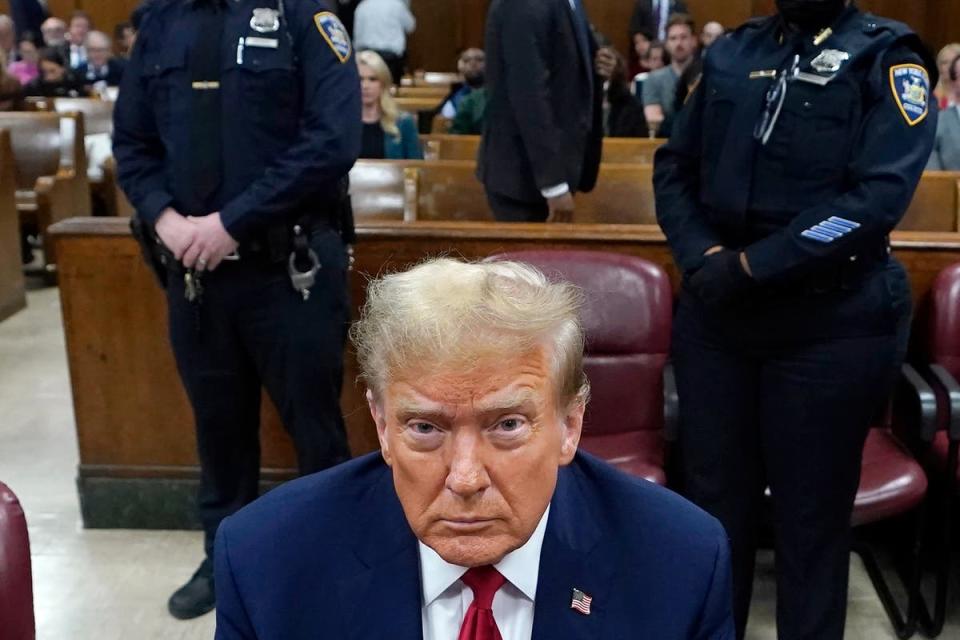

Supreme Court weighs Trump’s ‘presidential immunity’ claim. Here’s what that means
12:00 , Joe SommerladHere’s Ariana Baio on precisely what it is the judges have been considering ahead of their ruling today.Supreme Court weighs Trump’s ‘presidential immunity’ claim. Here’s what that means
Without Presidential Immunity, a President of the United States literally could not function! It should be a STRONG IMMUNITY, where proper decisions can be made, where our Country can be POWERFUL and THRIVE, and where Opponents cannot hold up and extort a Future President for… pic.twitter.com/QurlpNbBoK
— Donald J. Trump Posts From His Truth Social (@TrumpDailyPosts) June 30, 2024
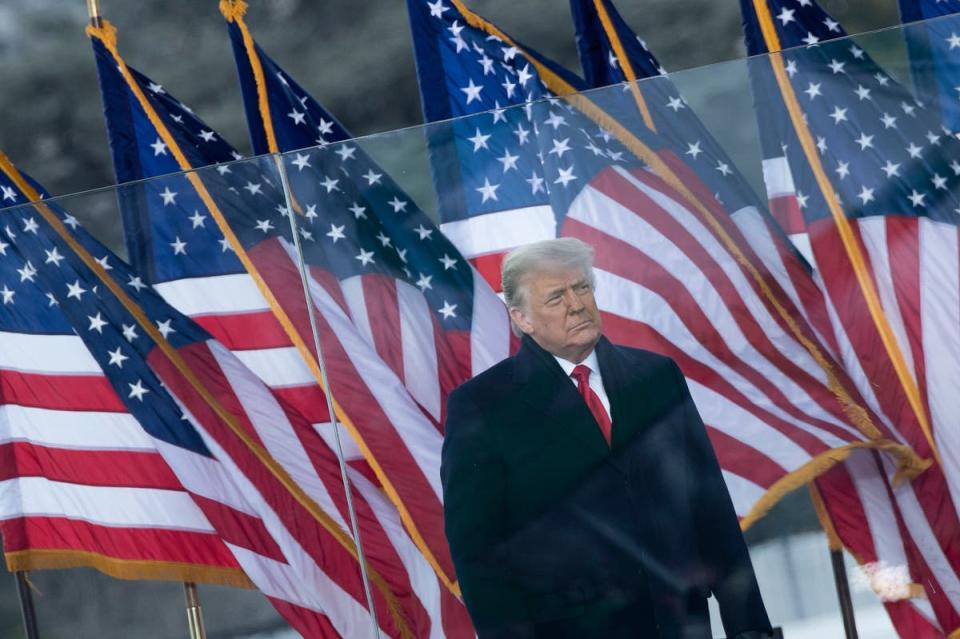

Is Trump immune from prosecution? We’re about to find out
11:00 , Joe SommerladThe former president’s defense has already been shot down by the federal judge overseeing the election interference case brought against him, as well as by a unanimous panel of appeals court judges, the latter writing that Trump’s attempts to stay in power after losing the vote to Joe Biden four years ago represented “an unprecedented assault on the structure of our government.”The question is now in the hands of the nation’s highest court.Its answer could have profound consequences for holding former presidents accountable for crimes committed while occupying the White House.But the court’s decision to take up the case – and to wait until the final day of its current session to issue a ruling – ensures that voters will not see a verdict in the case against Trump for unlawfully conspiring to overturn the last election before they cast their ballots in the next one this November.Here’s the latest from Alex Woodward.Is Trump immune from prosecution? Supreme Court will soon decide major question
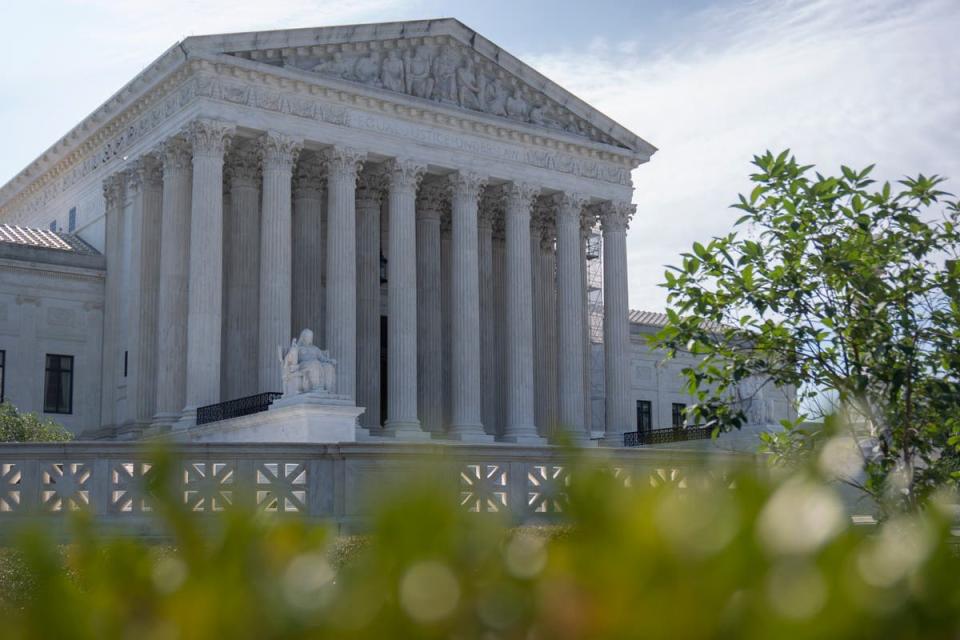

Supreme Court chief justice says final decisions of term coming on Monday
10:30 , Joe SommerladThis was the last we heard from the court on Friday.Justice John Roberts says the Supreme Court’s last decisions of this term are coming on Monday.
Hello and welcome!
10:04 , Joe SommerladGood morning and welcome to The Independent’s live coverage of the US Supreme Court as the nine justices prepare to hand down their long-awaited ruling on Donald Trump’s claim that he should be granted absolute immunity from criminal prosecution over any actions carried out during his tenure in the White House.The justices heard oral arguments on the matter in late April but have waited until the final day of their legislative term to reveal their ruling, which is expected to have huge consequences for this year’s presidential election between Trump and Joe Biden.
Source Agencies


